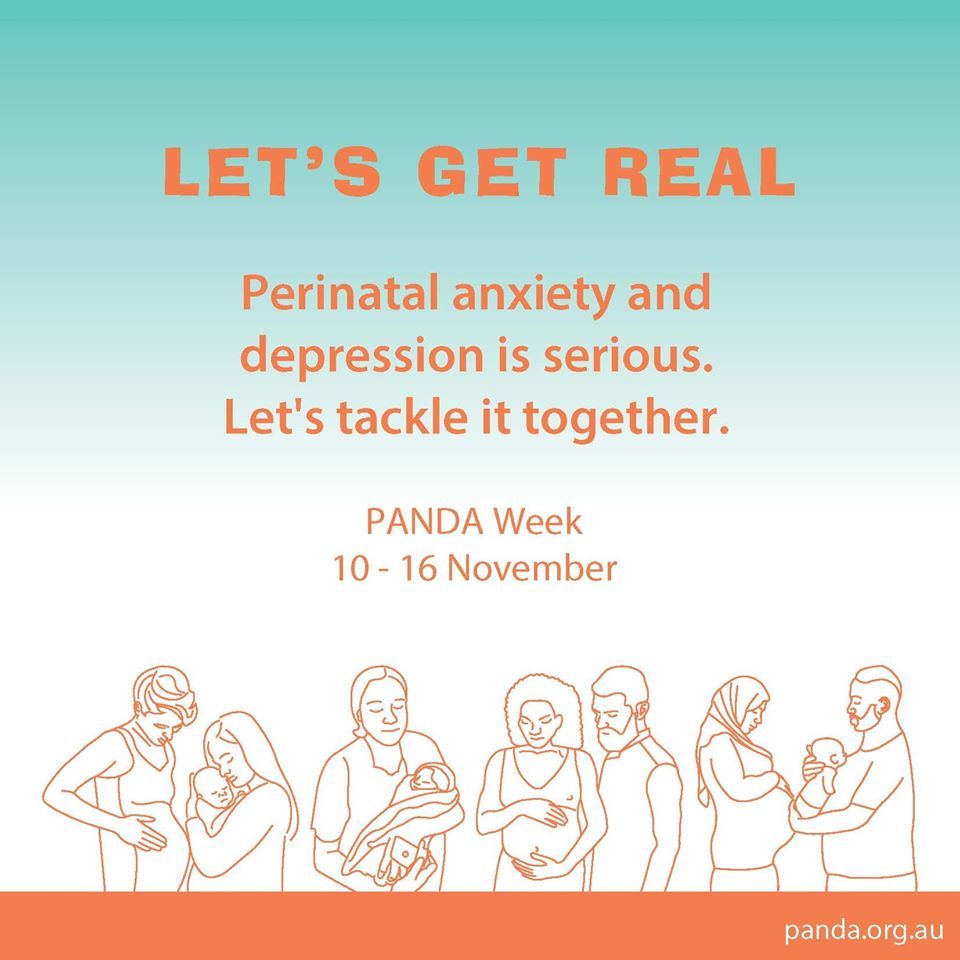
· By Productpreneur Marketing Collaborator
PANDA Week 2019
This week is PANDA Week and we wanted to share this article from PANDA Australia to help raise awareness for perinatal anxiety and depression, a serious and common illness for expecting and new parents.
PANDA’s National Helpline provides info & support to anyone affected by anxiety & depression during pregnancy & after childbirth, call 1300 726 306.
What is perinatal anxiety and depression?
Perinatal anxiety and depression is a serious and common illness. Up to one in five expecting or new mothers and one in ten expecting or new fathers will experience it. The illness affects around 100,000 families across Australia every year.
Left untreated, perinatal anxiety and depression can have a devastating impact on parents, partners, baby and the rest of the family. In the worst cases, lives can even be put at risk.
More than general ups and downs
Being pregnant or becoming a new parent can be both exciting and challenging. Having a degree of trouble adjusting to the changes that come with impending parenthood or the arrival of a new baby is natural.
Feeling a little ‘teary’, anxious or irritable for a few days in the weeks after the birth – often referred to as the ‘baby blues’ – is common, however, when a low mood or feelings of anxiousness start to cause concerns or stop an expecting or new parent from functioning normally for more than two weeks, they may be experiencing perinatal anxiety or depression.
What does perinatal mean?
The term ‘perinatal’ refers to the period from the conception of a child through to the first year after birth.
‘Antenatal’ refers to the pregnancy period. ‘Postnatal’ refers to the first year after birth.
What’s the difference between anxiety and depression?
In general terms anxiety refers to an aroused mood – panic, agitation, frustration or anger.
Depression is often associated with low mood, sadness, hopelessness or withdrawal.
Many expecting and new parents experience both anxiety and depression at the same time.
Talking about it
Perinatal anxiety and depression is a serious health condition. It can affect any new or expecting parent and does not discriminate. It is nothing to be ashamed of, but many new mums and dads find it hard to talk about it.
Expecting and new parents telling others about their struggles, or admitting they need help and seeking treatment or advice is not a sign of weakness. It shows that they want the best for themselves and their family.
Recognising perinatal anxiety and depression
Perinatal anxiety and depression can be difficult to recognise for a whole range of reasons. Symptoms are often dismissed as normal parts of pregnancy or early parenthood. Shame and stigma can lead to a ‘mask of coping’. Symptoms can look different for each person.
Signs may include:
- Feeling sad, low, or crying for no obvious reason
- Persistent, generalised worry, often focused on fears for the health or wellbeing of your baby
- Being nervous, ‘on edge’, or panicky
- Being easily annoyed or irritated
- Withdrawing from friends and family
- Difficulties sleeping, even when your baby is sleeping
- Abrupt mood swings
- Feeling constantly tired and lacking energy
- Physical symptoms like nausea, vomiting, cold sweats, lack of appetite
- Having little or no interest in the things that normally bring you joy
- Fear of being alone or with others
- Finding it difficult to focus, concentrate or remember
- Increased alcohol or drug use
- Panic attacks (racing heart, palpitations, shortness of breath, shaking or feeling physically ‘detached’ from your surroundings)
- Developing obsessive or compulsive behaviours
- Thoughts of death, suicide or harming your baby.
There are also many other symptoms not listed here. If you or someone close to you experiences any symptoms or feelings that worry you for two weeks or more, please seek support.
Postnatal psychosis
Postnatal psychosis is a rare but serious illness that affects one to two new mums in every 1000 and can put both mother and baby at risk. It almost always requires hospital admission. The symptoms often arrive suddenly and can include extreme mood swings, significant behaviour changes and loss of touch with reality.
If you suspect a new mum you know may have postnatal psychosis, you can:
- take her to a doctor
- take her to the nearest hospital emergency department
- call PANDA’s National Helpline – 1300 726 306
Where to seek help for perinatal anxiety and depression
We know that everyone experiences postnatal anxiety and depression differently. The best way for people who are struggling to start feeling better will depend on their own experience – what their symptoms are and how strongly they feel them.
What we do know is that the sooner people seek support, the sooner they can start feeling better.
It’s important for expecting and new parents who are worried about their emotional and mental wellbeing to seek support. They can speak with a trusted health professional such as a doctor or family health nurse, or call PANDA’s free National Perinatal Anxiety & Depression Helpline.
PANDA’s National Perinatal Anxiety & Depression Helpline 1300 726 306 9am – 7.30pm Mon – Fri (AEST/AEDT)
There is also important and up-to-date information about perinatal anxiety and depression and postnatal psychosis on PANDA’s websites: